Teaching Big: The Joy of Large Classes
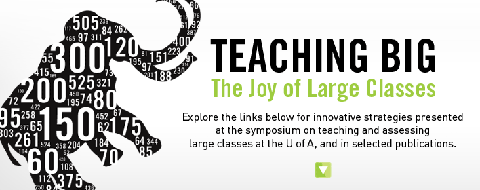
Date: August 15, 2012 - 8:00am to 1:30pm
Location: Edmonton Clinic Health Academy ECHA 2-490
CTL's Large Class Summer Symposium - Teaching Big: The Joy of Large Classes explored innovative strategies for teaching and assessing large classes at the University of Alberta.
Program
| Time | Session | Speaker |
|---|---|---|
| 8:00 - 9:00 ECHA 2 490 |
Poster Session & Continental Breakfast | |
| 9:00 - 10:00 | Keynote Speaker | |
| ECHA 2 490 | How you can learn to love large class assessment: Let me count the ways | Dr. Mark J. Gierl University of Alberta |
| 10:15 - 11:15 | Keynote Speaker | |
| ECHA 2 490 | Large class engagement and graduate teaching assistant involvement | Dr. Christine A. Stanley Texas A&M University |
| 11:30 - 12:00 | Invited Speakers Session 1 | |
| ECHA 2 140 | Thinking Out Loud to Bridge theClassroom and Practice | Dr. Hoan Linh Banh University of Alberta |
| ECHA 2 150 | Engaging Large Classes in Active Learning | Dr. Lisa Guirguis University of Alberta |
| ECHA 2 420 | Tutorials and Papers: Things That Work for Me in a Big Class | Dr. John-Paul Himka University of Alberta |
| ECHA 2 430 | Logistical Challenges of Large Classes | Dr. Jeremy Sit University of Alberta |
| 12:00 - 13:00 | Lunch, Poster Session and Networking Opportunities | |
| 12:15 - 12:45 | Optional Session | |
| ECHA 2 490 | Get Student Feedback in Real-Time by CentreClass* | Kevin Wu Notesolution |
| 12:15 - 12:45 ECHA 2 490 |
Draw for Book Prizes | |
| 13:00 - 13:30 | Invited Speakers Session 2 | |
| ECHA 2 140 | Peer Assisted Learning (PAL) Sessions in BIOL 207 | Dr. John Locke University of Alberta |
| ECHA 2 150 | Engaging Students In and Beyond A 400 Seat Freshman Lecture | Dr. Charles Lucy University of Alberta |
| ECHA 2 420 | Key Features of A Team Instructional Approach | Dr. Cheryl Poth University of Alberta |
| ECHA 2 430 | Bigger is Better! Encouraging Active Learning in Large Classes | Dr. Connie K. Varnhagen University of Alberta |
*Get Student Feedback in Real-Time by CentreClass

CenterClass is a simple app that engages your students to ask or vote on questions in real-time during class. It helps the instructor identify the top 5 questions at any time throughout the lecture and address them before the class ends. The app optimizes a professor's time in addressing student questions and eliminates the need to email the same response to multiple students.
The app is free for all U of A instructors and you can request an account at: http://centerclass.com/pbeta2012 and click on "Schedule Demo." Alternatively, you can contact Kevin at kevin@centerclass.com to get your CenterClass account.
Keynote Speakers

Dr. Mark J. Gierl, Keynote Speaker
How You Can Learn to Love Large Class Assessment: Let Me Count the Ways
Mark J. Gierl is Professor of Educational Psychology at the University of Alberta and the Canada Research Chair in Educational Measurement. Dr. Gierl's research interests include cognitive diagnostic assessment and technology applied to testing. His research is funded by the Social Sciences and Humanities Research Council of Canada, the Medical Council of Canada, and the College Board. He received his Ph.D. from the University of Illinois at Urbana-Champaign in 1996. With Dr. Jacqueline Leighton, he co-edited Cognitive Diagnostic Assessment for Education (2007), which won the American Educational Research Association Division D Significant Contribution to Educational Measurement and Research Methodology Award, and co-authored The Learning Sciences in Educational Assessment (2011), both published by Cambridge University Press. He is also co-editor for the upcoming book Automatic Item Generation: Theory and Practice.
Dr. Gierl's Presentation (PPT)
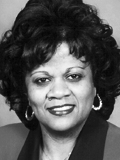
Dr. Christine A. Stanley, Keynote Speaker
Engaging Large Classes and Involving Graduate Teaching Assistants Effectively
Christine A. Stanley is Vice President and Associate Provost for Diversity at Texas A&M University, and Professor of Higher Education Administration. Her Ph.D. from Texas A&M University is in Curriculum & Instruction. Her research interests are in faculty professional development, instructional development, multicultural organizational development and college (university) teaching. Dr. Stanley has edited 2 books, has over 40 publications, 51 refereed national conference presentations, and has consulted nationally and internationally with faculty and administrators on faculty development issues in the United States, Armenia, China, Mexico, and South Africa. Among her publications are articles on developing graduate teaching assistants and a book on Engaging Large Classes that she edited and contributed to. Dr. Stanley is a Past President of the Professional and Organizational Development (POD) Network in Higher Education.
Dr. Stanley's presentation (PPT)
Invited Speakers
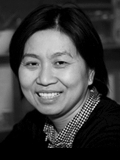
Dr. Hoan Linh Banh
Faculty of Pharmacy and Pharmaceutical Sciences
Thinking Out Loud to Bridge the Classroom and Practice
The use of interactive case presentation is one of the approaches to show students in professional programs how their theoretical knowledge can be applied in practical situations that they will soon encounter. In this session, the instructor shows a selection of video clips to illustrate and discuss how different teaching techniques can be used to actively engage large classes of students.
Dr. Banh's Presentation (PPT)

Dr. Lisa Guirguis
Faculty of Pharmacy and Pharmaceutical Sciences
Engaging Large Classes in Active Learning
"I can read the lecture notes at home," shared a millennial learner who like others expects more from her university experience. Yet, effective lecturers do more than entertain students. They use lecture time to actively engage learners with ideas and evaluate the student learning while effectively communicating required content. You will experience tools including one minute essays, self-care breaks, and a debate using think-pair-share that have been used successfully in large classes at the UofA.
Dr. Guirguis's Presentation (PDF)

Dr. John-Paul Himka
Department of History and Classics
Tutorials and Papers: Things That Work for Me in a Big Class
I teach an undergraduate survey, The History of the World in the Last Ten Years, which has 120 students. Our department does not have enough resources to allow me to hold tutorials every week, but I have developed a way to have tutorials anyway. This has many advantages for the students, but also for the TAs who help me. In my talk, I will explain both the logistics of these tutorials and the benefits that derive from them. I also experimented this year with a different type of tutorial than I usually run, and it seems to have worked rather well. I'll share that information too. On a different topic, this year I was in an unusual situation and had to take students' final papers in digital form by email. Although I did this out of necessity, I discovered a number of advantages that make me want to continue this method of collecting papers for all my future classes. In short, this is a practical session devoted to two admittedly disparate topics: 1) how to set up tutorials in the context of apparently inadequate resources, and 2) why you might consider going with paperless papers.
Dr. Himka's Presentation (PPT)
HIST 114 Syllabus (DOC) Paper Comment Sheet (DOC) Tutorial Section Questionnaire (DOC) Tutorial Sections 2012 (DOC) Tutorial Sections My List (DOC)
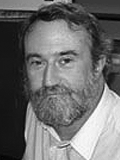
Dr. John Locke
Department of Biological Sciences
Peer Assisted Learning (PAL) Sessions in BIOL 207
Student learning in large classrooms is impeded by many factors. In BIOL 207, "Introduction to Molecular Genetics and Heredity", we require that students learn and apply the principles of genetics to theoretical and practical problems. Many students are either not prepared or are not confident enough to be successful with such problems on quizzes or exams. We have therefore instituted Peer Assisted Learning (PAL) Sessions to help address student difficulties with problem solving. The PAL sessions provide an opportunity for students to gain knowledge, skills, and confidence in their learning in a small, voluntary, non-authoritarian class setting. These sessions are led by senior undergraduate students who have been through the course already. Thus these leaders are familiar with the course content and can serve as a guide to help the current students to help themselves learn, which is the ultimate educational goal. The sessions guide students in various ways. They can confirm existing knowledge/understanding of a student, permit them to ask questions about basic facts, and get feed back on their learning from other students. Students who have participated in the PAL sessions appear to value their experience.
Dr. Locke's Presentation (PDF)
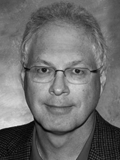
Dr. Charles Lucy
Department of Chemistry
Engaging Students In and Beyond A 400 Seat Freshman Lecture
"As you passively sit and read this abstract, consider ""Are you engaged?"" I suspect not. Clearly presenting paragraphs of dry text is not engaging. So how do we engage our students in large lectures? And should that engagement end when the bell rings and our students leave the room? I passionately believe not.
In this discussion (not presentation) we will explore strategies to engage students enrolled in large sections. I will share some of my strategies: tablet PC, remote slide changers, demos, show-and-share, example exam problems, spamming, and learning student's names. In implementing each of these I balance their effectiveness with the workload they require of me.
However I don't want to just talk. I want to learn about your strategies and successes. If you can't think of any, try reviewing some of the examples in the appendices of the recent wonderful report by Angelika Kerr of the Higher Education Quality Council of Ontario
PS. If you look up this report, you are already engaging in the session.
Dr. Lucy's Presentation (PPT)
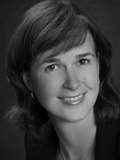
Dr. Cheryl Poth
Department of Educational Psychology
Key Features of a Team Instructional Approach
In this presentation, I will describe the key features of our team instructional approach aimed at enhancing the learning environment in a large class, multi-sectional course involving 1200 students, a coordinator and multiple instructors and graduate teaching assistants. From the perspective of the coordinator and instructor of an undergraduate multi-section course (EDPY 303, Educational Assessment), I will outline our practical solution for attending to some of the challenges for both students and instructors in large class environments. Specifically I will talk about our approach to collaborative course planning, delivery and assessment including increased coordination across 9 large class sections (average size 160) related to our instructional activities; consistency in our assessment scoring, and enhancing access to constructive feedback. Key features of our approach include scheduling weekly instructional team meetings for sharing experiences and information as well as fostering a culture of collaboration and learning within the team environment.
Dr. Poth's Presentation (PDF)

Dr. Jeremy Sit
Department of Electrical and Computer Engineering
Logistical Challenges of Large Classes
The steadily increasing demand for post-secondary education, coupled with a drive toward consolidation to leverage economies of scale, means growing class sizes and the accompanying challenges -- a solution that works for a small class no longer works when the class size is scaled up. Some of these challenges relate to delivery of the course material and assessment of student learning. This presentation, however, will focus on some of the logistical challenges of large classes, and discuss some ideas and methods that might be helpful for handling the day-to-day operations involved in teaching a large class. How do we as instructors get students engaged (interested and participating) and avoid the tempting path of anonymity? The answer, perhaps, is to get to know our students and show them that they are not just a number. Of particular interest are the logistics surrounding examinations. How do we ensure that the exam runs smoothly? What if there are problems? How would these be handled? I will present a suite of tools and ideas that form a complete framework for exam logistics and security, one which, most importantly, scales smoothly with class size, no matter how large the class ... or how small.
Dr. Sit's Presentation (PDF)
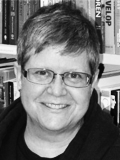
Dr. Connie K. Varnhagen
Department of Psychology
Bigger is Better! Encouraging Active Learning in Large Classes
Large classes are a joy! With large classes we have more learning and more ideas from more students. In this session we will practice and discuss evidence-based ways to encourage active learning in large classes. We will concentrate on using personal response systems to gauge learning, obtain feedback, and spark discussion (Caldwell, 2007; Mayer, et al., 2009; Shapiro & Gordon, 2012), brief discussions to encourage integration (Deslauries, Schelew, & Wieman, 2011; Smith, et al., 2010), and in-class demonstrations and simulations to engage students and promote deeper learning (Sharma et al., 2010).
Dr. Varnhagen's Presentation (PPT)
Poster Session
- Can You Hear Me Now? Overcoming Connection Barriers in Large Classes (PDF)
Dr Billy Strean, Professor
Faculty of Physical Education & Recreation
- Enabling Learners in Large Classes (PDF)
Dr Judy Gnarpe, FSO; Samuel Cheung, PhD Candidate; Che Colpitts, PhD candidate; Kristen Miller, MSc candidate; Stephanie Nicol, MSc candidate, Carla Craveiro Salvado, PhD candidate
Department of Medical Microbiology & Immunology, Faculty of Medicine & Dentistry
- Networked Narratives and the Cultural Adaptation Process of Practitioners Working Abroad (PPT)
Carolyn Freed
Faculty of Extension, Masters of Arts in Communications and Technology
- Introducing Community Service-Learning to a Large Introductory Sociology Classroom
Dr Jana Grekul, Assistant Professor; Wendy Aujla, Graduate Student; Laura Aylsworth, Graduate Student; Gergely Eklics, Graduate Student; Laura Graham, Graduate Student; Terra Manca, Graduate Student; Ashley Elaine York, Graduate Student
Department of Sociology, Faculty of Arts
- Using a Modified Version of the 'Experiences of Teaching and Learning Questionnaire' to Obtain Meaningful Student Feedback in Large Classes (PDF)
Dr Rachel Milner, FSO; Dr Adrienne Wright, FSO; Dr Jonathan Parrish, FSO; Ulemu Luhanga, Graduate Student
Department of Biochemistry, Faculty of Medicine and Dentistry
- Devising Large: A Methodology for Performer Created Theatre with a Large Ensemble (PDF)
Michele Brown, Contract Instructor
Department of Drama, Faculty of Arts
- A Novel and Extended Use of an Online Learning Community in Team Based Learning
Dr Tracey Hillier, Assistant Dean Undergraduate Medical Education; Dr Anna Oswald, Course Coordinator Musculoskeletal PreClinical Block Undergraduate Medical Education; Dr Robert Hayward, Associate Dean Clinical Informatics
Department of Radiology and Diagnostic Imaging, Faculty of Medicine and Dentistry
- "Help Me Learn in a Big Class!": Key Features of an Effective Team Instructional Approach (PDF)
Dr Cheryl Poth, Assistant Professor; Maria-Clara Bustos-Gomez, Graduate Student; Man-Wai Chu, Graduate Student; Paolina Seitz, Graduate Student; Ekaterina Chudnovskaya, Graduate Student; Ulemu Luhanga, Graduate Student; Shan Stafiej, Graduate Student; Wei Tang, Graduate Student; Maureen Mills, Sessional Instructor; and Tim Coates, Sessional Instructor
Department of Educational Psychology, Faculty of Education
- "All For One and One For All": An Innovative Approach for Enhancing TA and Instructor Experiences in Multi-section Courses (PDF)
Dr Cheryl Poth, Assistant Professor; Man-Wai Chu, Graduate Student; Maria-Clara Bustos-Gomez, Graduate Student; Ekaterina Chudnovskaya, Graduate Student; Paolina Seitz, Graduate Student; Shan Stafiej, Graduate Student; Ulemu Luhanga, Graduate Student; Wei Tang, Graduate Student; Tim Coates, Sessional Instructor; and Maureen Mills, Sessional Instructor
Department of Educational Psychology, Faculty of Education
- Role of Homework, Quizzes, and i>clickers in Student Performance: A Preliminary Analysis for Introductory Chemistry (PDF)
Xi Li, IRC staff; Dr Charles A. Lucy, Professor; and Dr Alex Brown, Professor
Department of Chemistry, Faculty of Science
Resources
- Recent Books and Chapters on Large Classes (PDF) - August 2012
- Sample Articles on Large Classes (PDF) - August 2012